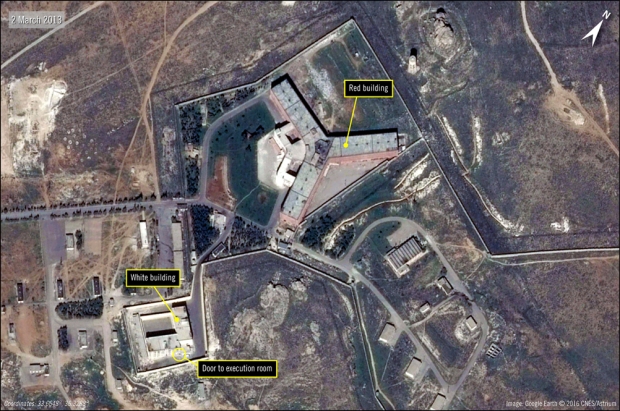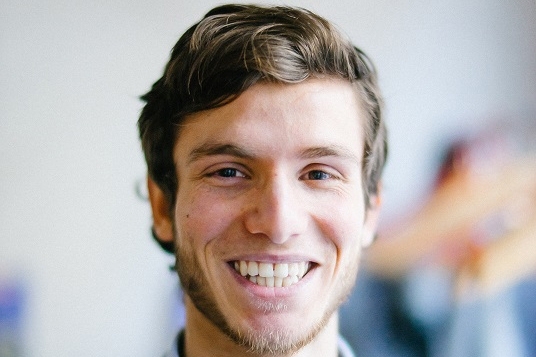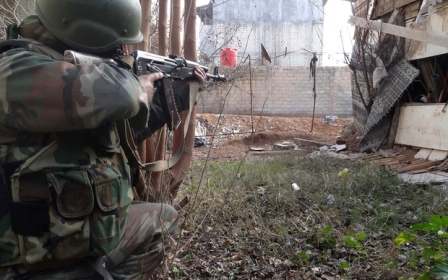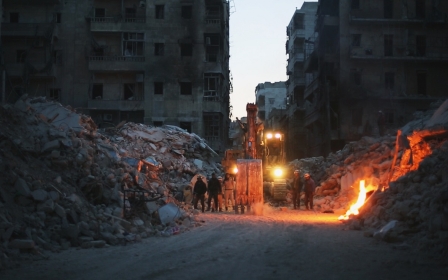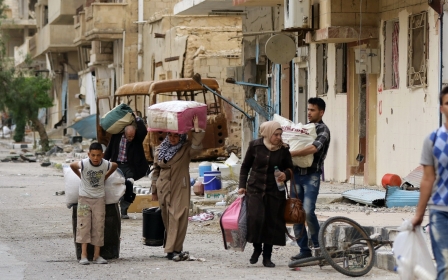From Saydnaya to Sweden: Syrian torture victim teaches compassion and gratitude
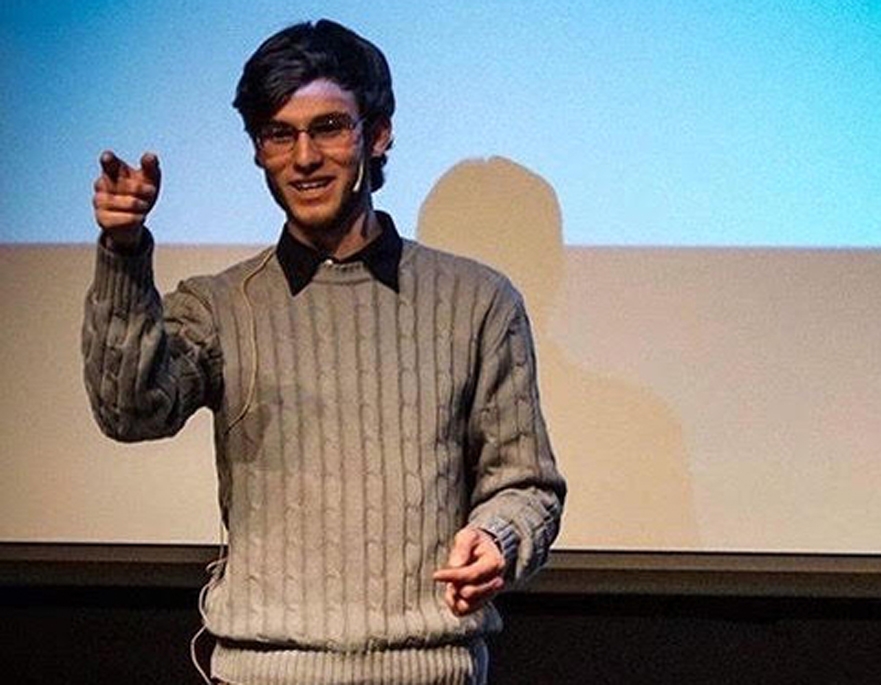
GUSTAVSBERG, Sweden - They are ranked among the world's happiest citizens, but now Swedes are taking lessons in positive living from a survivor of torture in President Bashar al-Assad's prison cells.
Last month in Gustavsberg, a quaint town famous for its porcelain production 20 minutes from Stockholm, 21-year-old Omar al-Shogre addressed an audience of over 120 in a lecture with the title, “From the world’s most dangerous prison, to Sweden.”
“After the shocking torture, I told the investigator to stop, and that I would tell him everything he wanted,” Shogre tells his audience of his past, as they alternate between groans and gasps of horror.
“I sat down and started to say anything possible. Then the interrogator said to me, ‘OK, that is enough,’ but I said, ‘No, I have more’. I was afraid of going back to the torture if I stopped talking.”
Recounting the torture
Shogre is perhaps not the likeliest speaker on positive living. He was starved and tortured in 10 different prisons in Syria after participating in the anti-government protests that erupted in 2011. He was electrocuted on all parts of his body, including his genitals, forced into false confessions, and witnessed widespread rape of other prisoners.
But he speaks with confidence and coherence, having learnt to speak fluent Swedish within a year of his arrival in Stockholm.
“It is impossible for the human mind to understand Syrian prisons. Nobody can imagine it,” Shogre told Middle East Eye privately, away from the stage. “Even when I remember it now, I cannot believe how I am still alive.”
'Even when I remember it now, I cannot believe how I am still alive'
Shogre has also spoken in Sweden's frozen north, with the encouragement of people he first met in the country. Lisbeth Karbin's family was originally assigned as a guardian for Shogre's younger 12-year-old brother Ali, before the siblings moved to Stockholm.
"In the beginning, I saw that Omar was frustrated when he tried to tell me about his past; he waved his hands and tried to demonstrate using body language, picking up the phone and trying to translate with it. But it took him only a few weeks to speak Swedish," Lisbeth told MEE.
On hearing Shogre's story, she encouraged him to share it more widely. Just after the new year, with temperatures of -30C outside, Shogre addressed an audience in Kalix, near Lisbeth's home and Sweden's border with Finland. "We had politicians, healthcare professionals [among the audience]; it was a great lecture," she said. "Omar gives so much of himself; he gets people to listen, to be interested."
Shogre's talks, which he organises in universities and public theatres across Sweden, combine his experience in detention with facts about Syria's dark history of dictatorship. His last lecture carried the subtitle, “Welcome to a small part of the truth.”
Saydnaya's dark secrets
Shogre's story of survival came as Amnesty International released a report on torture and execution in Saydnaya, the notorious political prison in the mountains 30km north of Damascus.
In findings cumulating from a year of research, the monitoring group states that as many as 13,000 people have been hanged to death there since 2011.
“Thousands of people have been extra-judicially executed in mass hangings, carried out at night and in the utmost secrecy,” the report finds. “The bodies of those who are killed at Saydnaya are buried in mass graves.”
In the report issued on Tuesday, Amnesty said that it is “inconceivable” that these “large-scale and systematic practices” have not been authorised at the highest levels of the Syrian government.
Other prisoners saved his life on multiple occasions: by giving him their food rations to stop him wasting away, and by convincing guards not to kill him
According to the Syrian Network for Human Rights, there are 215,000 people held in detention in Syria, nearly all of them by the Assad government.
Shogre spent nearly a year in Sednaya, where he contracted tuberculosis and which he describes as “horrifying”. He fled to Sweden after his mother paid a $15,000 bribe for his release in June 2015.
In prison, “there was a lot of torture, beating with metal sticks, and being suspended from the ceiling, and electrocution,” Shogre told his most recent audience.
Although Shogre says he would never repeat his time in detention, he says that it represented "the best days of my life" because it "taught me how to be human," calling it the "school of prison".
The best and worst of humanity
He feels that he owes his survival to other prisoners' magnanimity. He said that other prisoners saved his life on multiple occasions: by giving him their food rations to stop him wasting away, and by convincing guards not to kill him. He saw the best and worst of humanity, and feels a responsibility to tell the world what is happening in Syria's prisons.
With that, Shogre, from the village of al-Bayda in Syria’s coastal Tartous province, is teaching the need for gratitude and compassion. Rather than through hackneyed advice about positivity, he does so in a deft presentation of a dreadful past.
The Swedish public, citizens of the world’s 10th most content country, according to last year’s UN-commissioned World Happiness Report, are following him in increasing numbers. After just a couple of months of public speaking, videos of Shogre’s lectures are attracting more than 16,000 viewers on Facebook Live.
“Omar is so strong and very inspiring, and it’s good that he can talk about it without being sad,” she told MEE afterwards. “He teaches us to be open-minded because there are maybe things you would not dream of waiting in the future.”
'Omar is so strong and very inspiring, and it’s good that he can talk about it without being sad'
Never give up
After describing and demonstrating – with mid-air actions – the beatings he suffered in detention, Shogre makes the audience laugh with his tales of accustomising to life in Sweden. He recounts the initial meetings with the couple who would eventually give him a safe home: “I used Google – I answered yes and no, yes, no, yes, no, yes, no, to everything I did not understand.”
“Just listening to Omar, you feel a lot of inspiration,” said Olle Oberg, 25, a cameraman and YouTube video producer from Stockholm. “The message is that you must never give up, and that we must not take life for granted. We must not ignore what is going on in the world. It might happen to you; Omar was in that situation in Syria, and now he is here.”
Audiences who attend Shogre’s lectures are also often confronted with details about Syria’s history that have been lost among images of Islamic State group militants and bombed-out cities.
'The message is that you must never give up, and that we must not take life for granted'
“In Syria, the intelligence and security services do not mean safety,” Shogre told his audience in Gustavsberg, explaining the country’s rife corruption networks and state security apparatus.
“They mean fear. The police in Sweden are not like in Syria – there is a vast difference. The intelligence and security forces mean that you have got to run away, otherwise you will lose your life.”
Syrian revolt
Shogre is determined to recount the beginning of the Syrian uprisings in 2011, in an attempt to increase awareness of civilians’ fight for freedom, telling stories from the early days of the revolution.
"He [Bashar al-Assad] decided to send his forces, and the security services went and arrested the boys, who were about 10 years old. They took them to a security branch and tortured them," he said.
'Everything is easy for me in life except for prison. Prison is the only difficult thing in life'
“Children who had watched the news about the [revolutions in] Egypt and Tunisia and saw the slogans – ‘Freedom’ and ‘the people want the fall of the regime,’ took pens and wrote on walls: ‘Ijay’ik al-dour ya dok-tor’ (Doc, now it’s your turn) Shogre explains, referring to Assad's training as an ophthalmologist before his brother's death in a car crash saw him accede to the Syrian presidency.
“We don’t really think about the issues of the protests and the prisoners in Syria,” said Emil Monikander, 20, a student from Stockholm. “We only see the bombings. Omar’s story is very moving and he tells it so well that you can feel you are there. It makes you realise our lives are not that bad compared to others.”
Some people are shocked at Shogre’s willingness to talk about what happened to him.
“People sometimes think that I am weird, and I am not thinking straight as I talk about thousands of bodies, burning, torture, and organs being cut out,” Shogre explains. “I laugh and act normally as I talk about these things, while other people are crying. Everything is easy for me in life except for prison. Prison is the only difficult thing in life.”
Feeling responsible
Local authorities have helped Shogre achieve his aim of spreading the message about Syria’s detention facilities.
“I met Omar for the first time in the library and was asked if I would like to set up his lecture,” said Ann-Helen Johansson, head of the library at the municipality of Värmdö.
Was she concerned about disturbing the audience? Despite Shogre’s positivity, his story could undeniably cause upset. “I was never worried,” she said, although children under 15 had to be accompanied by an adult to attend. “It’s important to try to understand what is going on in Syria. I did not know about the government prisons. Omar is a very special person, so full of life. I hope he can find a good life here in Sweden.”
Does Shogre himself not find the process of reliving the traumatic experiences he lived difficult? Would he not prefer to forget it and try to build a new life in Sweden without the memories of a painful past? He insists absolutely not.
'Whenever I sleep, I dream of being tortured and burned. I see my friends being killed'
“There are two kinds of people who leave prison,” Shogre says, in a reflective tone. “People who want to forget the torture, war and pain and live peacefully. But there are people who cannot forget what happened to them and their lives and families in Syria. I remember everything from prison, all the torture and my friends’ deaths.”
'I am my own therapist'
Shogre carries the weight of responsibility of a free man who can speak out, knowing there are still tens of thousands of people incarcerated in Syria.
“A lot of prisoners come out of prison very tired physically and psychologically, and cannot talk about what happened to them. Whenever I sleep, I dream of being tortured and burned. I see my friends being killed. That gives prisoners a reason not to talk about it, because they want to forget.”
In some way, speaking publicly is therapeutic for Shogre. Knowing that sharing his ordeal can help others deal with challenges in their lives, as well as raise awareness about the grim situation in Syria, gives him solace.
He tried seeing a therapist to help him deal with what happened in his past, but he said that this did not help him much, adding, "I am my own therapist".
Many Swedes cannot help but notice that this young man's enthusiasm for life is taking him places.
“We Swedes are not that enthusiastic and he is so positive about things. I think Omar is only just beginning; I think we are going to see more from him,” Dedering said.
This article is available in French on Middle East Eye French edition.
New MEE newsletter: Jerusalem Dispatch
Sign up to get the latest insights and analysis on Israel-Palestine, alongside Turkey Unpacked and other MEE newsletters
Middle East Eye delivers independent and unrivalled coverage and analysis of the Middle East, North Africa and beyond. To learn more about republishing this content and the associated fees, please fill out this form. More about MEE can be found here.


